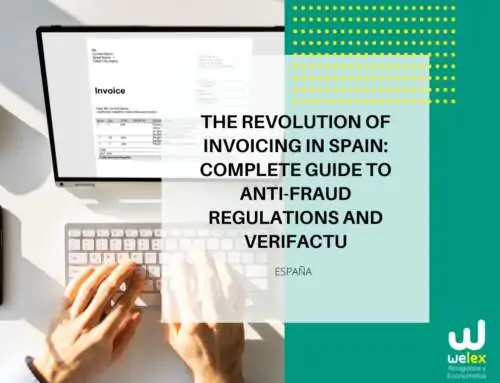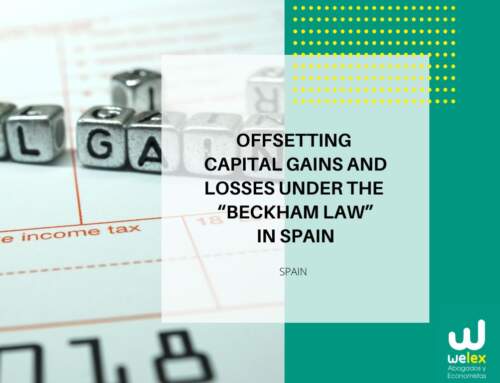When an individual acquires fiscal residency in Spain by staying for more than 183 days and/or meeting the requirements established in the Double Taxation Treaty, they may be required to file and pay the Wealth Tax and the Solidarity Tax on Large Fortunes, depending on their assets. Additionally, they must file the Personal Income Tax (IRPF) based on their worldwide income.

If part of that income is taxed in the country where it originates, the taxpayer may apply a tax credit for the amounts paid abroad, provided that the Double Taxation Treaty allows for such an offset.
Who is Considered a Tax Resident in Spain?
According to Spanish Personal Income Tax (IRPF) regulations, an individual is considered a tax resident in Spain if they meet any of the following conditions:
- They stay in Spain for more than 183 days within a calendar year.
- Their main business, economic interests, or professional activities are based in Spain, either directly or indirectly.
- Their spouse (not legally separated) and minor dependent children habitually reside in Spain. This third condition allows for rebuttal with appropriate evidence.
What if I am a Non resident in Spain?
If your stay in Spain is less than 183 days withing a calendar year, then you need to file the named Non-Resident Income Tax, also known as IRNR or Form 210.
Tax Implications for Foreigners Moving to Spain
If a foreign national changes their fiscal residency to Spain, they become liable for Personal Income Tax (IRPF) as a tax resident. This means they must declare all income earned worldwide in Spain, regardless of its origin. However, the Double Taxation Treaty between Spain and the taxpayer’s country of origin may allow them to deduct taxes already paid abroad from their Spanish tax liability (double taxation relief).
How Do Double Taxation Treaties Work?
You might ask yourself “How can I avoid double taxation on my income?”. International Double Taxation Treaties establish different categories of income and determine which country has the right to tax each type:
- Exclusive taxation in the taxpayer’s country of residence.
- Exclusive taxation in the country where the income originates.
- Shared taxation, where both countries can tax the same income, but the country of residence must provide mechanisms to avoid double taxation.
When and How to File Spanish Income Tax Returns?
Spanish tax residents must file their Personal Income Tax (IRPF) return between April and June of the year following the tax year in question. For example, the tax return for year X must be submitted in April, May, or June of year X+1.
Taxation of Different Types of Income in Spain
Under Spanish IRPF regulations, income is taxed differently depending on its nature:
- Salary and rental income are taxed under the general tax scale.
- Dividends, interest, and capital gains are taxed under the special tax scale.
Other frequently Spanish-resident Tax-Related questions.
Navigating the Spanish tax system can be complex, particularly for expats and individuals with assets abroad. To help you stay compliant, here are some essential guidelines regarding income tax, foreign asset declarations, and wealth tax obligations in Spain.
1. When is the deadline for filing the Spanish income tax return (IRPF)?
For the 2024 tax year, the deadline to submit your Personal Income Tax Return (IRPF) electronically is June 30, 2025. It is highly advisable to file well in advance to avoid last-minute issues and potential penalties.
2. How do I declare properties or bank accounts held abroad?
If you hold assets outside of Spain—such as bank accounts, investments, or real estate—with a combined value exceeding €50,000 per category as of December 31st, you must submit the Modelo 720 (Declaration of Foreign Assets). This declaration is mandatory for residents in Spain and must be updated if the value of any category increases by more than €20,000 in subsequent years.
3. How does earning income abroad affect my tax return in Spain?
Spain operates on a worldwide income taxation system, meaning that all foreign income—whether from employment, rental properties, or investments—must be reported on your Spanish tax return. Even if the income has already been taxed in another country, it remains subject to Spanish taxation. However, Spain has numerous double taxation treaties that can help avoid being taxed twice on the same income.
4. Does obtaining a Spanish residency permit (TIE, NIE) automatically make me a tax resident?
While obtaining a NIE (Foreigner Identification Number) or a TIE (Tarjeta de Identidad de Extranjero) is an essential step for legal residence in Spain, it does not automatically confer tax residency. You are considered a tax resident in Spain if you meet one of the following criteria:
- You spend more than 183 days per year in Spain.
- Your primary economic interests (such as employment or business activities) are based in Spain.
- Your spouse or dependent children reside in Spain.
If any of these conditions apply, you are required to file a Spanish tax return and declare your worldwide income.
5. How do I declare my foreign income in Spain?
Foreign income is declared as part of your Personal Income Tax Return (IRPF). The process varies depending on the type of income (employment, dividends, rental income, etc.), and it is crucial to ensure proper reporting to benefit from any available tax credits under double taxation treaties.
6. Am I required to pay Wealth Tax (Impuesto sobre el Patrimonio) in Spain?
Spain imposes a Wealth Tax on both Spanish and foreign assets. The tax applies if your worldwide assets exceed the regional exemption threshold, which varies across Spain but is generally around €700,000. Some regions, such as Madrid, have additional reductions or exemptions. If you qualify, you must file a Wealth Tax return in addition to your annual income tax return.
For personalized tax guidance, it is always advisable to consult a tax professional familiar with Spanish and international taxation laws.
Welex, your Trusted Multilingual Tax Advisor
At Welex, we understand that navigating Spanish tax regulations can be challenging, especially for international clients. Our team of multilingual tax advisors is here to provide expert guidance, ensuring that your tax obligations are met accurately and efficiently.
Trust Welex to handle your Spanish tax return with professionalism and personalized attention. Contact us today and let us take the complexity out of your tax matters!






Social Media